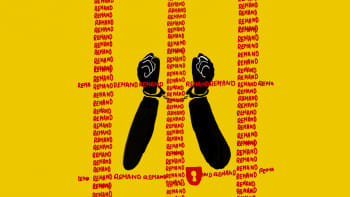Sumon Sheikh's custodial death: Too many questions unanswered

The poignant image on the front page of this daily on August 21 of a young widow, wailing in grief, melted readers' hearts. The photo was of Jannat, wife of Sumon Sheikh, a 25-year-old deliveryman who died inside the lock-up of Hatirjheel Police Station on August 20, within several hours of his arrest. Police say Sumon died by suicide. His family members reject the claim and allege that police demanded bribes, and tortured and framed him. "They killed my husband. We went to the police station to file a murder case, but police didn't record it. We want justice," stated his wife to the media. Not surprisingly, police refuted the family's assertion.
Sumon's death triggered a protest in Rampura Bazar area, where protesters blocked DIT Road to form a human chain and demand justice. Earlier, protests also erupted in front of Hatirjheel Police Station, and police had to resort to truncheon charge to disperse the agitating crowd. Sumon's brother asserted that, in one instance, activists of the ruling party's student wing pounced upon the agitators. The police later stated that the deceased stood accused in a case over the theft of Tk 52 lakh on August 15.
Sumon's family's resolve not to accept his mortal remains until they succeed in filing a case was thwarted when the police and local Awami League leaders forced Sumon's father to receive it from the hospital morgue. Jannat and her family members reported that the body was sent to the morgue for autopsy without their knowledge; they were angry that they were not informed of the handover and the burial beforehand. Jannat's brother said he felt deceived that the police took the body for burial in Azimpur, even when he and Jannat were made to wait for the police at the court. Earlier, Jannat stated that police refused to hand over Sumon's body when she went to collect it, and a sub-inspector of Hatirjheel Police Station told her it would happen only if he was buried in their village home of Nababganj, "and under no circumstances would the body be given (to the family) if they planned to take it to (the) deceased's home in Rampura," according to media reports. Subsequently, the deputy commissioner of police in Tejgaon division denied imposing any such conditions. On August 21, a national television channel telecast footage ostensibly of Sumon dying by suicide, captured on the CCTV camera inside the police lock-up.

The Sumon episode triggered a number of questions about the police's role. Firstly, one of the basic features of any detention facility should be ensuring that the detainees get no opportunity to inflict self-harm. Even if the suicide story is taken at face value, the question remains: How was Sumon able to die by suicide in an environment that is under the full grip of the police? Second, filing a complaint with a law enforcement agency is a basic right of every individual. Why did the functionaries of Hatirjheel Police Station refuse to record Jannat's complaint about her husband's death under suspicious circumstances? Third, was the police not obliged to inform the next of kin, i.e. Jannat, about the impending autopsy on the deceased's body, as well as the timing and site of the burial? Fourth, under what authority did the police impose conditions on handing over the deceased to the family? Fifth, why were the police authorities in such a rush to hand the body over only a day after they refused to do so, and were not sensitive to the wishes of the traumatised family members regarding accepting it only after filing the case in court?
Sixth, don't citizens have the right to stage peaceful protests against the wrongful treatment (including inflicting mental harm) of an individual – that, too, in police custody? Was resorting to force the only option available to the police in dealing with peaceful protesters? Did the police force take any measure to apprehend the perpetrators and protect the protesters when the latter were attacked and chased away by supporters of the ruling party? Seventh, it is a relatively easy task to monitor a walled premise, such as a lock-up of a police station. In all likelihood, such a monitoring mechanism would have alerted the police station authorities about Sumon's impending attempt to inflict self-harm. Would the police authorities offer any explanation as to whether the CCTV cameras at this sensitive site were being monitored in real time? If not, then would the authorities explain the purpose of setting up such a surveillance system? Doesn't such omission amount to gross negligence and appalling planning? And finally, while the CCTV footage does not indisputably establish the case of suicide, isn't the circulation of the footage, which shows an individual purportedly committing self-harm, morally and ethically wrong?

Sumon Sheikh was an ordinary person, bereft of influential political and social contacts, and thus vulnerable to extortion and abuse. He was in good health. His family members have staunchly claimed that he was subjected to torture. Only an impartial investigation can establish the veracity of such a claim. There is little doubt, however, that the victim was subjected to severe mental torture that might have prompted him to die by suicide, if the police claim of suicide is to be believed. Such a stack of questionable acts effectively undermines the police's claim that the deceased committed theft, and raises the issue of whether such a claim is aimed at demonising the deceased.
The custodial deaths of Sumon and others like him are not deemed important enough to generate parliamentary debate, nor do they instigate suo motu action on the part of higher judiciary. These incidents, on the one hand, are perhaps too sensitive for the National Human Rights Commission (NHRC) to look into, and on the other hand, may not be felt worthy enough for the engagement of the guardians of the nation's conscience and the mainstream intelligentsia.
In a judgment on a writ petition filed by BLAST in 2003, the High Court issued a series of directives that included allowing a detainee to meet lawyers, and obliging the law enforcers to secure permission from a magistrate before interrogation, hold the interrogation with glass walls or grills on one side within the sight of the detainee's lawyers or relatives, and ensure medical check-up of the detainee by a doctor before and after interrogation. The state's appeal against the High Court judgment was rejected by the Appellate Division, giving the directives "a binding effect." Unfortunately, the landmark directive of the apex court still remains unimplemented.

It is unfortunate that custodial torture continues to be pervasive in a country that has enacted the Torture and Custodial Death (Prohibition) Act, 2013 – in short, TCD (Prevention) Act – and ratified the UN Convention against Torture and Other Cruel, Inhuman or Degrading Treatment or Punishment. It is time that the recommendations of the UN Committee against Torture to the Bangladesh government were implemented in proper stride. Those include unambiguous decisions be taken at the highest level of the government that torture and ill treatment will not be tolerated under any circumstances or against any person; that the government has no intention of limiting the applicability of the TCD (Prevention) Act and it applies to all forces; that all officials who commit acts of torture and ill treatment will be prosecuted and punished with penalties commensurate to the crime of torture, including those with superior or command responsibility; that measures will be taken to ensure that confessions obtained from criminal suspects through torture or ill treatment will not be accepted in practice as evidence of guilt; and that systematic statistical data will be collected on the implementation of the TCD (Prevention) Act on the number of complaints, investigations, prosecutions and trials and convictions.
The UN committee also recommended that the state also commit to carrying out prompt, impartial, effective criminal investigations into all complaints of torture and ill treatment by setting up an independent investigation mechanism, an effective victim and witness protection system, an oversight monitoring body to ensure adherence to the provisions of the TCD (Prevention) Act, and ensure training of medical professionals to assess torture allegations in accordance with the Istanbul Protocol.
Sumon's death has demonstrated the extent of ill treatment that detainees may suffer in custody. It has also revealed the challenges their loved ones may face in seeking justice. The case has rattled ordinary citizens about their vulnerability to abuse of state power by the errant members of law enforcement agencies. It is time the political leadership, particularly those at the helm of law enforcement, took dispassionate stock of the situation and corrective measures (based on the Supreme Court directives and Committee on CAT recommendations) so that state agencies treat citizens with respect and dignity. Needless to say, being treated in accordance with the law and only in accordance with the law is the foundation of such treatment.
Dr CR Abrar is an academic and human rights expert.

 For all latest news, follow The Daily Star's Google News channel.
For all latest news, follow The Daily Star's Google News channel. 










Comments